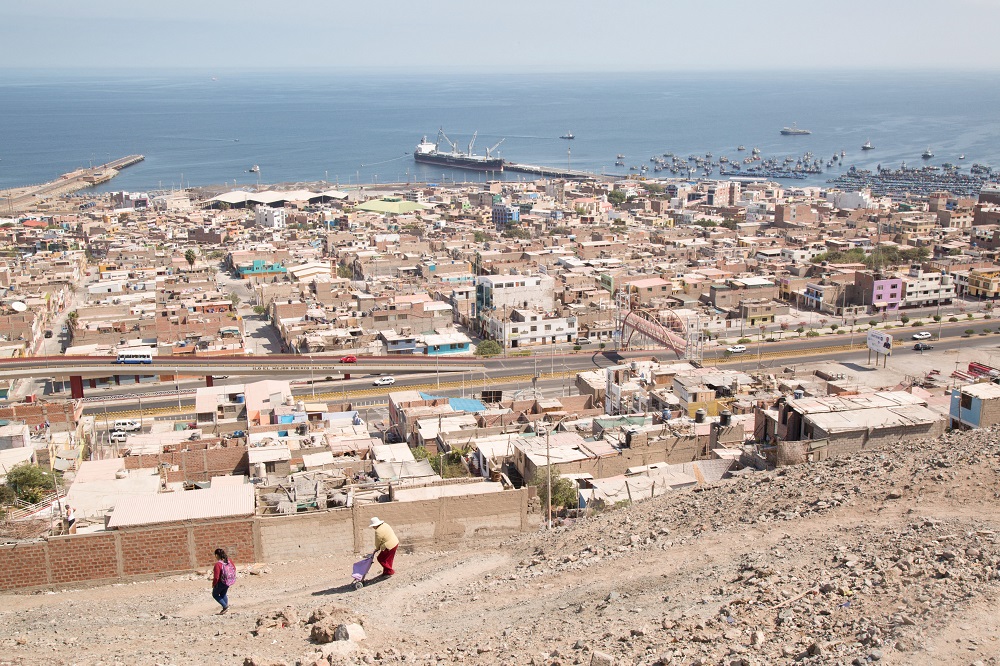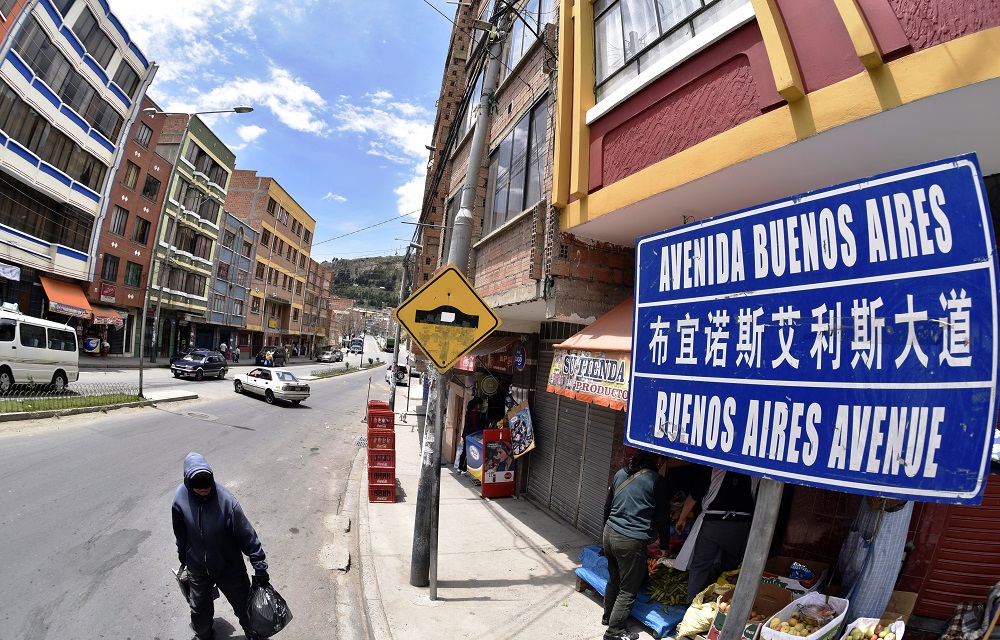China Violates Human Rights in Peru - Israel Electric Profits From Maya Massacres
Peru fights for its economic, social, and cultural rights as it faces the disproportionate growth of Chinese companies
Guatemala Communities Rebel Against High Energy Costs
NACLA-Aug 22, 2018
Guatemala Communities Rebel Against High Energy Costs ... in protest after Energuate, owned by Israeli-owned energy company IC Power, .... Construction of new hydroelectric projects across the country has fueled the
https://dialogo-americas.com/en/articles/china-violates-human-rights-peru
China Violates Human Rights in Peru
TRANSNATIONAL THREATS

The Amazon tribes Achuar, Kichwa, and Quechua protest in front of the Chinese Embassy in Lima, Peru, against unregulated Chinese oil exploitation, which pollutes the water and the Amazon rainforest and violates human rights. (Photo: Cris Bouroncle, AFP)
Peruvian nongovernmental organizations (NGOs) expressed their concern about the growing economic influence and increasing participation of Chinese companies in Latin America. These companies consistently violate human rights, pollute waters and the region, and threaten the health and culture of indigenous populations, as they carry out extractive and energy projects and build infrastructure for their own benefit.
 The Bioceanic train will depart from the Port of Ilo, Peru, and connect the country with Brazil via Bolivia and the Amazon, as part of China’s new Silk Road project. (Photo: Fabien Dupoux/Hans Lucas, AFP)
The Bioceanic train will depart from the Port of Ilo, Peru, and connect the country with Brazil via Bolivia and the Amazon, as part of China’s new Silk Road project. (Photo: Fabien Dupoux/Hans Lucas, AFP)
“They [Chinese companies and banks] behave unethically. We are fighting for our rights at the international level,” Julia Cuadros, mining specialist and board member of the Peruvian NGO CooperAcción, told Diálogo. “They take advantage of the weak Peruvian legislation and violate rights that citizens are entitled to by law.”
The Universal Periodic Review (UPR) is a United Nations (UN) mechanism the Human Rights Council established in 2005. It conducts cyclic assessments of human rights issues in the organization’s 193 member states.
“In November 2018, the UN sent its third UPR to the People’s Republic of China. This review features specific recommendations and commitments to halt violations against human and environmental rights by private and public Chinese companies, especially those operating overseas,” Cuadros said.
China is set to officially respond to the document in March 2019, but the Asian nation already warned that some recommendations won’t be accepted unless they are aligned with their national policies. “Meanwhile, Chinese companies and banks violate the human rights of Peruvian and South American communities,” Cuadros said.
“China sees us only as a source of natural resources,” Nelly Ledezma, a specialist in labor law for Peru’s mining and steel sectors, told Diálogo. “It has a voracious appetite for raw material.”
The report
The International Federation for Human Rights and the Coalition for China’s Investments and Funding in Latin America, along with 15 other South American NGOs, submitted a report in October 2018 titled, The Civil Society’s Evaluation of the Extraterritorial Obligations of the People’s Republic of China: Case Studies from Argentina, Bolivia, Brazil, Ecuador, and Peru. The document shows 18 Chinese projects supported by 15 trusts and six banks from Asia. Seven of those projects are in the mining industry, six in the oil industry, and five in the hydroelectric sector.
The NGOs condemned four Chinese companies for violating human rights in Peru: Mineral and Metal Group in Apurímac, Chinalco in Junín, Shougang in Ica, and Zijin Mining Group in Río Blanco, Piura department. “We welcome foreign investment, but not at the expense of people’s rights and the environment,” Ledezma said.
 In La Paz, Bolivia, some avenues carry names in Spanish, Chinese, and English. China is the main importer of products in Bolivia. (Photo: Aizar Raldes, AFP)
In La Paz, Bolivia, some avenues carry names in Spanish, Chinese, and English. China is the main importer of products in Bolivia. (Photo: Aizar Raldes, AFP)
The report concludes that the human rights violations by Chinese companies and financial organizations in the five countries are not isolated acts, but rather show a systematic pattern of labor, environmental, and cultural transgressions. It describes continuous violations that the Chinese government perpetrated with full awareness, as well as a lack of monitoring and effective measures to comply with extraterritorial obligations in its international commitments.
In November 2018, Amnesty International published the report, China: Human Right Violations in the Name of National Security. The report asserts that the Asian power restricts certain liberties at home, such as speech, free association and peaceful assembly, religion and creed, fair trial, non-refoulement, no arbitrary detention, and no discrimination.
“An official commitment from the Chinese government is unlikely as long as they violate their own population’s rights,” Ledezma said. “In its quest to relocate its production and crown itself a world power, China attempts to impose a 19th century type of industrial development in Peru and South America, through cruel and exploitative practices.”
The Peruvian case
The Peruvian Ministry of Energy and Mining told the press that more than 20 percent of mining investments in the country are Chinese and worth $11.7 billion. China is Peru’s main commercial partner and main buyer of minerals, such as copper, iron, and gold.
“Additionally, China participates in the energy and strategic infrastructure sector in Peru,” Juan Carlos Mathews, vice-president of the World Trade Center Lima, told Diálogo. “In the next three years, the Chinese will invest $10 billion in those sectors.”
The October 2018 report states that the largest mining project in the Andean nation, Las Bambas MMG, located in the Apurímac region, transports 370 daily truckloads of minerals and chemicals since 2015, with adverse health consequences for 18 rural communities along the trucks’ path. Chinalco, which leads the Toromocho project in Junín region, relocated the Morococha population to a humid seismic area with unsanitary conditions. Locals, especially children, are always sick because of the humidity.
In Ecuador and Bolivia, mining projects have forcefully displaced many indigenous communities. In Chile, hydroelectric projects will affect the archaeological and cultural patrimony of Mapuche communities in Araucanía. In Belo Monte, Brazil, a hydroelectric plant affected local communities’ hunting and fishing mechanisms.
Cuadros and Mathews agree that the Peruvian case is critical due to the major impact of Chinese investment on rural communities. The lack of response and rather uncooperative stance of Asian companies and financial institutions, considering the negative impact of their investments on human rights, are also alarming.
“They should not only guarantee communities’ rights, but also meet their obligations, because non-compliance combined with corruption leads to deficiencies and conflict,” said Mathews. “China’s government should be accountable for the actions of Chinese companies in our countries,” Cuadros concluded.
No comments:
Post a Comment